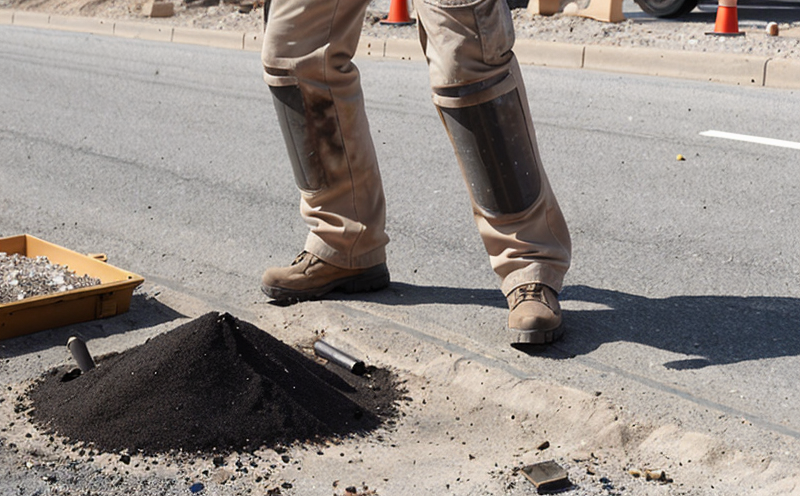ISO 22478 Detonation Pressure Testing of Explosives
The ISO 22478 standard provides a method to measure detonation pressure, which is crucial for understanding the explosive properties of materials in mining applications. This test helps ensure that blasting agents meet safety and performance standards necessary for effective and safe mining operations.
Detonation pressure testing is critical because it allows engineers to predict how an explosive will behave under extreme conditions. By understanding these pressures, mines can optimize their blasting processes to achieve the desired fragmentation while minimizing overbreak and ensuring worker safety. This test is particularly important in sectors where precise control of energy release is essential for both efficiency and safety.
The testing process involves subjecting a sample of the explosive material to an electric detonator that initiates detonation. The resulting pressure wave is captured using specialized instrumentation, such as piezoelectric sensors or high-speed cameras. These measurements are then analyzed to determine the peak pressure reached during detonation. This data helps in characterizing the explosive's sensitivity and performance, providing valuable insights for R&D departments.
The ISO 22478 standard ensures consistency and reliability across different testing facilities by providing a standardized procedure. Compliance with this international standard is essential for manufacturers to ensure their products meet global safety standards before they enter the market. This consistency also benefits end-users like mining companies, who can rely on accurate test results when selecting appropriate blasting agents.
For quality managers and compliance officers responsible for ensuring product safety and performance, ISO 22478 offers a robust framework to monitor adherence to industry best practices. By adhering to this standard, organizations demonstrate their commitment to maintaining high-quality standards in their manufacturing processes.
- Competitive Advantage: Compliance with ISO 22478 can provide a significant competitive edge by ensuring that products meet or exceed international safety and performance standards. This can lead to enhanced reputation among clients, increased market share, and reduced liability risks.
- Market Impact: Adherence to this standard can help mining companies comply with regulatory requirements, thereby minimizing the risk of legal challenges and operational disruptions. It also ensures that they are using state-of-the-art testing methods, which is increasingly important in an industry focused on sustainability and safety.
In conclusion, ISO 22478 detonation pressure testing plays a vital role in ensuring the safe and effective use of explosives in mining operations. By providing accurate measurements of peak pressures during detonation, it supports the development of safer and more efficient blasting agents. For those responsible for quality assurance, compliance with this standard is not just a regulatory requirement but also a strategic investment in business success.
Applied Standards
The ISO 22478 standard specifies the procedure for measuring detonation pressure of explosives using piezoelectric sensors. This test method is essential for evaluating the performance and safety characteristics of blasting agents used in mining operations. The standard ensures that all testing facilities follow a consistent and reproducible process, leading to reliable and comparable results.
The ISO 22478 procedure involves placing the explosive sample into a specially designed chamber equipped with piezoelectric sensors. When the electric detonator ignites the sample, it generates a pressure wave that is measured by these sensors. The peak pressure value obtained from this measurement directly reflects the explosive's sensitivity and performance.
Compliance with ISO 22478 is crucial for manufacturers of blasting agents as it ensures their products meet international safety standards. For mining companies, adherence to this standard provides confidence that they are using high-quality materials that can be relied upon during critical operations. The standard also supports regulatory compliance by ensuring that testing practices align with global best practices.
By adhering to ISO 22478, manufacturers and users of explosives demonstrate their commitment to safety and quality in mining applications. This not only enhances the reputation of the company but also builds trust among stakeholders, including clients and regulatory bodies.
Scope and Methodology
The ISO 22478 standard outlines a method for measuring detonation pressure in explosives using piezoelectric sensors. This test is particularly relevant for mining applications where precise control of energy release is essential for both efficiency and safety.
The testing process involves placing the explosive sample into a specially designed chamber equipped with piezoelectric sensors. When the electric detonator ignites the sample, it generates a pressure wave that is measured by these sensors. The peak pressure value obtained from this measurement directly reflects the explosive's sensitivity and performance.
Compliance with ISO 22478 ensures consistent and reliable results across different testing facilities. This standard provides detailed instructions on setting up the test environment, preparing the sample, and conducting the actual test. It also specifies the instrumentation required for accurate measurements and the criteria used to interpret the results.
The methodology outlined in ISO 22478 is designed to provide a standardized approach to detonation pressure testing, which is essential for ensuring that all tests are conducted under consistent conditions. This consistency allows for reliable comparisons between different samples and facilitates quality control efforts within manufacturing facilities.
For mining companies, adherence to this standard provides confidence that they are using high-quality materials that can be relied upon during critical operations. The standard also supports regulatory compliance by ensuring that testing practices align with global best practices.





